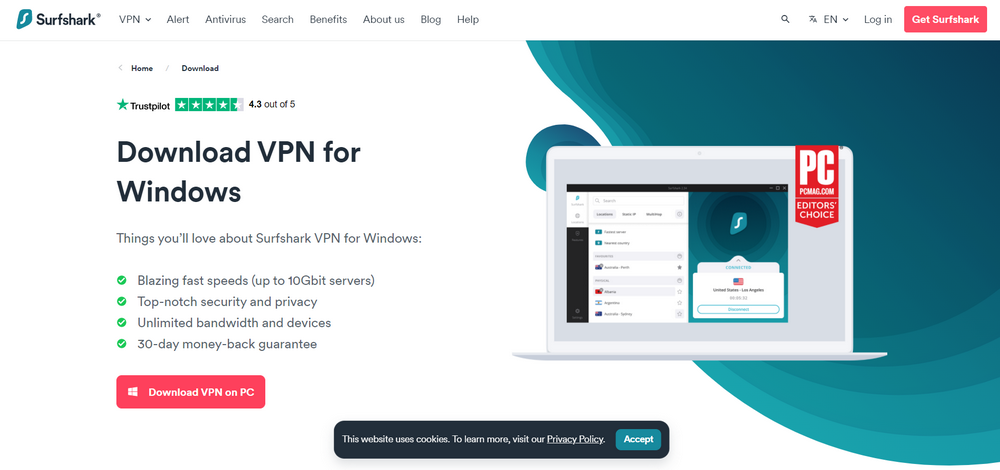VPN For Windows : Are Free Ones Worth It?
Every month it feels like our bank cards are pillaged by subscriptions.
Netflix, Spotify, YouTube Plus, the list goes on, and - yes - it can
hurt!
You might be thinking you're thrifty with that free VPN. Yes, you can save
a few bucks with a VPN chrome extension or a provider you heard about from a
friend. But you have to ask yourself if you aren’t paying with money, what’s
the real cost?

How Do Free VPNs Make Money?
If you aren’t paying, you are the product.
Free VPNs are in the business of collecting user data and selling it to
advertisers. They don’t all do this, but you can bet that they are making
money in some way.
VPNs aren’t in the charity business, and it’s expensive to run a VPN server
that can handle hundreds of concurrent connections. Not to mention the cost
of developing a client with the current cost of engineers and
developers.
Slow Services That Funnel You Towards Paying For A Service
If VPNs aren’t selling your data, they are likely offering you an extremely
throttled service with only a few servers.
The option to increase your speed is always a button click away. On the next
screen, you’ll be asked to enter your credit card details.
Some of these free VPNs will only let you connect for an hour at a time, or
they’ll say you’re connecting to a US server, while in reality, your
connection is going through a server in Iran or Mongolia.
If you can put up with the slow speeds, questionable servers, and constant ads
encouraging you to upgrade then go right ahead. You have to ask yourself
though, why not just cough up the little bit of money and get it over and done
with. It’s worth it for the peace of mind.
Free VPNs Come With Security Concerns
When a VPN logs your data, and all the bad ones do, a record exists somewhere
of what you do online.
Now, you are trusting that this VPN provider will never be hacked and expose
your browsing history to the world. It’s not spoken about much, but you trust
a VPN provider just as much as you trust your ISP. Unless the government is
asking them to, your ISP has no real reason to keep a record of what their
customers do online, and you can be reasonably confident that with all their
technical experience no one has built a back door into their network.
Imagine you’re sending data over HTTP, passwords and usernames, and credit
card information is all transiting that VPN server as clear text. If there’s
any variability in that server then a hacker can see all that information.
They can set up a bot that listens for HTTP communication, and saves it
automatically.
A CSIRO study
found that 72% of free VPN providers used embedded third-party trackers for
analytics, tracking, or advertising purposes.
Free VPNs Have Outdated Or Ineffective Encryption
That same CSIRO study found that 84 percent of the analyzed apps didn't
properly encrypt the online data of users. This means that it could be easier
for snoops to track what users are doing when browsing the Internet.
That’s pretty scary. If you’re using a VPN with faulty encryption you’d be
way safer with no VPN at all. These vulnerabilities expose you to data
leaks, identify theft, phishing scams, MITM attacks and other cybersecurity
issues.
If you have any cryptocurrency, please stay away from free VPNs. Traffic to
metamask and other wallets can be identified and then the fraudsters know to
target you. You might start receiving emails that look suspiciously like
legitimate exchanges asking you to log in by entering your private keys. All
it takes is one fat-fingered mistake after a long day at work, and they’ll
clean you out.
The VPN provider could be infected with malware
A VPN server is a computer, and it can download software just like any other
computer.
That CSIRO study we keep mentioning found that of the 10 VPNs most likely to
be infected with malware, six were free ones. Malware in your VPN is never
good. It can lead to malware in your computer, and once you have malicious
software in the application layer then every single keystroke you perform on
your computer can be recorded. Once that happens, nothing is safe. All your
passwords, bank login details, photos, company emails and more are privy to
international shadowy super coders. And they know exactly how to use these
details.
Does This Mean That A Paid VPN Is Automatically Safe?
Nope. Every problem that can affect a free VPN can also inflict a paid one.
The thing is that paid VPNs trade on their reputation. They hire proper IT
professionals, conduct regular audits and aren’t incentivised to sell
customer data to advertisers. The more reputable the VPN the
better.
Although we’d recommend staying away from the biggest VPN providers as they
tend to be targeted. Surfshark is a good choice. It’s reputable but not so
well known that all the IP addresses are flagged because they are on all the
VPN blacklists. Here is their
VPN for Windows
if you are interested.
In Summary
A free VPN really isn’t worth it. They are either incredibly slow, riddled
with ads or malware, or they sell your data to advertisers. Now that
everyone is internet banking, and identities can be stolen with a photo of a
passport, we need to be careful online. If you can’t afford a paid VPN, our
advice is don’t use one at all.


